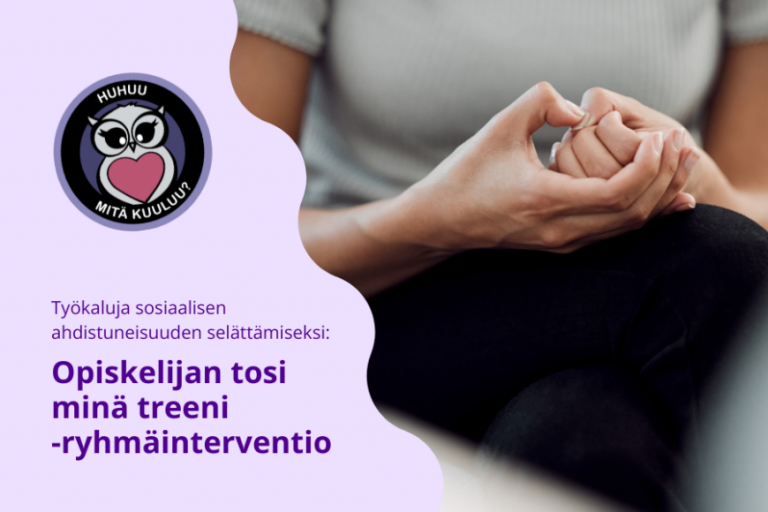Loneliness is not the same as being alone. Loneliness is an unwanted lack of social contacts and relationships. We can feel lonely because we have few or no social contacts or because our social contacts do not meet our emotional needs.
Most of us are able to relate to the feeling of loneliness. As all feelings, the feelings of loneliness come and may eventually pass. Occasional loneliness is normal, but prolonged loneliness is a cause for concern. Chronic loneliness is harmful to our health and has been associated with a number of psychological problems, such as depression, anxiety and self-destructive behaviour. Loneliness can be a very painful feeling. Research has shown that loneliness activates the same areas in the human brain as physical pain. So loneliness really does hurt.
People who are lonely may feel like an outsider and think that no one cares, and so become increasingly withdrawn socially. They may start to avoid social situations and will therefore not have the opportunity to build or deepen relationships with others.
It can be difficult to admit to being lonely because of the associated shame. When we feel lonely, we may easily also feel inadequate or think there is something wrong with us. We may struggle to open up about our loneliness even to our nearest and dearest, because feelings of shame keep us silent.
Still, we can all do something to combat loneliness, not only our own but also that of others. We can raise concerns, share experiences and talk about loneliness to increase hopefulness and break the cycle of shame. Knowing we are not alone can help to create a sense of belonging and make us feel better.
A sense of belonging and connectedness is a basic human need. We all need to feel we are accepted for who we are, both at our best and our worst. It is important for everyone to be seen, heard and understood. We all go through moments when we need to be supported, comforted and encouraged. We need one another for all this!
In the following sections, we invite you to take a moment to think what you can do to reduce loneliness, either your own or that of others, and offer you some suggestions. You can select the tips that work for you.
- What are your interests? What kind of company do you need?
Activities and hobbies bring together people with shared interests and are a good way to get to know others, build contacts and cultivate a sense of belonging. What activities interest you? Find hobbies that match your interests or, for example, join the activities of your student association. As a member of SportUni you may participate in the activities of Tampere Universitie’s sport clubs. There are also different applications available, such as Meet Up , that will help you get to know others.
- Have you experienced loneliness? Do you have someone to share your experiences with?
We can all sometimes feel we have no one to talk to. The following services are available for talking about any issues in a confidential setting:
-
- Different chat services, such as Nyyti Ry’s thematic chats.
- The services provided by the University, such as Navigaattori and the university-wide guidance and counselling services.
- University Chaplain is available for pastoral counselling, mentoring, coaching and also gives more information of services for international students. Read more about The Student Chaplaincy of the Evangelical Lutheran parishes in Tampere.
- The Finnish Red Cross runs a friendship programme that you can join.
- Association for Mental Health in Tampere: Osviitta Crisis Center
- Mental health | The Finnish Association for Mental Health (mieli.fi)
- Helplines, such as Mieli ry’s crisis hotline: call 09 2525 0113.
- Do you prefer to reflect on your experiences independently?
Besides talking and sharing experiences, the independent reflection of one’s thoughts, emotions and behaviour promotes self-awareness and can help in finding ways to overcome loneliness:
-
- HelsinkiMissio’s Loneliness workbook (in Finnish; can be downloaded for free) will help you work through and ease your feelings of loneliness. The information and exercises included in the workbook encourage you to reflect on your emotions, thought patterns, behaviour and social interactions. Read information about loneliness.
- Could you ask your fellow students how they are doing and whether they feel lonely now that all students are studying from home? Could you do something to help someone who feels lonely?
We can all take an interest in others by asking how they are doing and offering a sympathetic ear. You can always show you care! If you do not know what to say, say it. Listening can go a long way towards helping a person who feels lonely. If experiences are difficult to put into words, doing some everyday things together, like studying or chatting, is a great way to show support.
- Could you take an active role in your student group or class and encourage others to study together? What kind of practices or small things could facilitate encounters and foster a sense of community and a supportive atmosphere among students?
For example, weekly virtual meetings or reading circles with a fellow student or a group of students can provide not only structure to learning but also peer support and thereby create positive energy and a sense of belonging. To support effective academic progress, students can use the facilities on campus or the University Library to study together, as long as the pandemic restrictions allow it.
Arranging short kick-off meetings via Zoom or Teams each morning, with all the participants listing their personal learning goals for the day, can create positive peer pressure and help students stick to their goals and maintain their motivation while studying independently. Taking breaks together (such as virtual coffee breaks or lunch breaks) can also work wonders in building a sense of community among students now that.
- Are there ways to make an even bigger difference? Are you interested in taking action to help prevent and reduce loneliness in your student community?
There is a range of activities and services available that help people meet and connect with others. Find out what activities your student association and clubs are offering and join them!
-
- Read more about our community’s new befriending activities.
- Though the friendship programme of the Finnish Red Cross, you can volunteer to become a support person to a person who feels lonely.
- Take part in the Join us campaign to combat loneliness (in Finnish).
- Share your tips and ideas for reducing loneliness: Now that students are studying remotely, we invite all students to share their tips for reducing loneliness through Padlet.
We hope you enjoy studying and building connections this spring,
Study psychologists Sonja, Taija, Simo and Hanna
References (in Finnish):
Niina Junttila’s speech “How to identify a lonely child or adolescent?” delivered at the 2017 Psychology Fair.
Niina Junttila’s speech at an event hosted by the Mental Health Central Union on 14 December 2020: Why is loneliness bad for our health?
Psykopodiaa podcast: Talking about loneliness with guest Niina Junttila.
Psykopodiaa podcast: Loneliness: listener questions, guest: Niina Junttila.
The coronavirus survey conducted by the student union TREY in September 2020 (in English).





